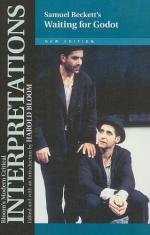|
This section contains 8,379 words (approx. 28 pages at 300 words per page) |

|
SOURCE: Lawley, Paul. “‘The Rapture of Vertigo’: Beckett's Turning-Point.” Modern Language Review 95, no. 1 (January 2000): 28-40.
In the following essay, Lawley probes Beckett's characters' tendency to leave the known—albeit unhappy—stability of their lives and throw themselves, unbalanced, toward death, chaos, and subsequent rebirth.
In interview, Samuel Beckett always evinced a sharp sense of the shape of his creative life. There had been a large shift and it had been relatively sudden, a recognizable turning-point: ‘Molloy and the others came to me the day I became aware of my own folly’ [‘le jour où j'ai pris conscience de ma bêtise’], he told Gabriel D'Aubarède in 1961; ‘only then did I begin to write the things I feel.’1 The nature of the shift is clear from a number of sources. The work of James Joyce was the necessary point of reference in Beckett's definition of the folly and...
|
This section contains 8,379 words (approx. 28 pages at 300 words per page) |

|


